八年级上册英语1-3单元重点知识点归纳(XX版)
人教版新目标八年级英语上册1、2、3、4单元知识点总结材料

新目标八年级英语上册第一单元Unit 1.How often do you exercise?I. 重点短语归纳:on weekends 在周末1. go to the movies 去看电影2. look after=take care of 照顾、照看3. surf the internet 上网4. healthy lifestyle 健康的生活方式5. go skateboarding 去滑滑板watch TV看电视6. keep healthy=stay healthy = keep in good health 保持健康keep + 形容词表保持某种状态do some reading 阅读7. exercise= take/do (much) exercise=do sports锻炼8. eating habits 饮食习惯9. take more exercise 做更多的运动10. the same as 与什么相同11. once a month一月一次12. be different from 不同13. twice a week一周两次.three times a week一周三次14. make a difference to 对什么有影响As teachers, you must believe that you can make a difference to the li ves of your students. 身为教师,你们必须坚信你们能够影响学生的一生。
A false step will make a great difference to my future.错走一步对我的前程来说会产生很大影响。
15.how often 多久一次,询问动作发生的频率一般用once a week ,twice a month ,every day ,sometimes等回答。
(精品)八年级英语上册一至三单元知识点小结(XX版新目标英语)154

八年级英语上册一至三单元知识点小结(XX版新目标英语)本资料为woRD文档,请点击下载地址下载全文下载地址 XX秋季新版八年级上册英语第一至三单元知识点小结 Unit1 wheredidyougoonvacation? .onvacation度假 vacation意为“假期、假日”,相当于holiday,但vacation表示长的假期。
如: thelongvacation长假 thesummervacation暑假 thechristmasvacation圣诞假期 而holiday(尤其美国)指“假日;休息日;休假”。
onvacation=onholiday意为“度假” 2.anythinginteresting一些有趣的东西 )something,anything,nothing,everything是指物的不定代词。
somebody,someone,anybody,anyone,nobody,everybo dy,everyone是指人的不定代词。
somewhere,anywhere,nowhere,everywhere是指地点的不定代词。
2)当形容词修饰something,anything,nothing,everything等不定代词时,放在这些词的后面; 3)这些不定代词做主语时,谓语动词用第三人称单数。
如: Iseverybodyhere?大家都到齐了吗? 4)something,somebody,someone,somewhere用于肯定句及表示请求或建议的疑问句中,而anything,anybody,anyone,anywhere用于否定句及疑问句中。
如: Didyoudoanythinginteresting?你做了有趣的事吗?(表疑问) whydon’tyouvisitsomeonewithme?你为什么不跟我一起去拜访下某个人呢?(表建议) 3.buysth.forsb.或buysb.sth 如:myparentsoftenbuysomebooksforme.=myparentsoftenbuym esomebooks. 我父母经常给我买书。
八年级上册UNIT1-3知识点总结

Unit1 Where did you go on vacation?重点短语1. go on vacation去度假2.stay at home 待在家里3.go to the mountains 去爬山4. go to the beach 去海滩5. visit museums 参观博物馆6. go to summer camp 去参加夏令营7.quite a few 相当多8.study for 为……而学习9.go out 出去10.most of the time 大部分时间11. taste good 尝起来很好吃12.have a good time 玩得高兴13. of course 当然14.feel like 给……的感觉;感受到15.go shopping 去购物16.in the past 在过去17. walk around 四处走走18. because of 因为19. one bowl of… 一碗……20. the next day 第二天21. drink tea 喝茶22. find out 找出;查明23. go on 继续24.take photos 照相25. something important 重要的事26. up and down 上上下下27. come up 出来28. buy sth. for sb. / buy sb. sth. 为某人买某物29. taste + adj. 尝起来……30. look+adj. 看起来……31.nothing…but+动词原形除了……之外什么都没有32.seem+(to be)+ adj. 看起来……33. arrive in+大地点/ arrive at+小地点到达某地34.decide to do sth. 决定去做某事35. try doing sth. 尝试做某事/36. try to do sth. 尽力去做某事37. forget doing sth. 忘记做过某事/38. forget to do sth. 忘记做某事39. enjoy doing sth. 喜欢做某事40. want to do sth. 想去做某事41. start doing sth. 开始做某事42. stop doing sth. 停止做某事43. dislike doing sth.不喜欢做某事44. keep doing sth. 继续做某事45. Why not do. sth.? 为什么不做……呢?46. so+adj.+that+从句如此……以至于……47. tell sb. (not) to do sth. 告诉某人(不要)做某事48 .have a good time=enjoy oneself=have fun(doing sth.)玩得痛快语法:复合不定代词或副的构成及用法构成:由some, any, no, every分别加上-body, -thing, -one构成的不定代词叫做合成不定代词;加上-where 构成副词。
八年级上册英语一到三单元笔记

八年级上册英语一到三单元笔记Unit 1 Where did you go on vacation?一、重点单词。
1. anyone.- 词性:代词,意为“任何人”,常用于疑问句和否定句中。
例如:Did you meet anyone interesting on your vacation?(你在假期遇到有趣的人了吗?)2. anywhere?- 词性:副词,意为“在任何地方;无论何处”。
例如:I can't find my keys anywhere.(我到处都找不到我的钥匙。
)3. wonderful.- 词性:形容词,意为“精彩的;绝妙的”。
例如:We had a wonderful time at the beach.(我们在海滩度过了一段美妙的时光。
)4. few.- 词性:形容词,意为“很少的;不多的”,修饰可数名词复数,表示否定意义。
例如:There are few apples on the tree.(树上几乎没有苹果了。
)- 区别于“a few”,“a few”表示“一些;几个”,有肯定意义。
例如:There are a few students in the classroom.(教室里有几个学生。
)5. most.- 词性:形容词,意为“大多数的;大部分的”。
例如:Most students like English.(大多数学生喜欢英语。
)- 也可作名词,意为“大多数;大部分”。
例如:Most of the time, I stay at home.(大部分时间,我待在家里。
)6. something.- 词性:代词,意为“某事;某物”,常用于肯定句中。
例如:I have something to tell you.(我有某事要告诉你。
)- 区别于“anything”(用于疑问句和否定句)和“nothing”(意为“没有什么;没有东西”)。
例如:Do you have anything to drink?(你有什么喝的东西吗?)There is nothing in the box.(盒子里什么都没有。
英语八年级上册1~3单元知识点

英语八年级上册1~3单元知识点一、单元一:Hello !1. 问候和自我介绍1.1 问候语在日常交流中,问候是非常基础而且重要的部分,例如:Hello!Hi!Good morning/afternoon/evening!1.2 自我介绍当你第一次见到某人时,你需要用英语介绍自己,包括自己的尊称、芳龄、爱好等信息。
例如: My name is Tom. I'm 14 years old. Ilike playing basketball and listening to music.2. 询问及回答2.1 询问对方的尊称和芳龄询问对方的尊称和芳龄是交流中的基本内容,例如:What's your name? How old are you?2.2 回答询问当他人询问你尊称和芳龄时,你需要会做简单而又礼貌的回答,例如:My name is Lily. I'm 13 years old.3. 介绍自己的朋友3.1 描述外貌在介绍朋友时,需要用英语描述对方的外貌特征,例如:He has short black h本人r and big blue eyes.3.2 描述性格和爱好介绍朋友的性格及爱好也是非常重要的部分,例如:She is outgoing and she likes singing and dancing.二、单元二:My Day1. 时间表及日常活动1.1 表述时间在日常生活中,我们需要学会用英语表达时间,例如:It's seven o'clock. It's time for breakfast.1.2 描述日常活动描述日常活动是非常重要的,通过用英语描述,可以让对方更好地了解你的生活,例如:I get up at six thirty in the morning.2. 描述一天的安排2.1 早上在英语中,描述早上的活动需要用适当的词汇和句子结构,例如:In the morning, I usually have breakfast at seven o'clock.2.2 中午描述中午的安排也需要合适的表述方式,例如:At noon, I have lunch with my classmates.2.3 下午形容下午的活动也需要用英语来描述,例如:In the afternoon, I play basketball with my friends after school.3. 时间状语及延续性动词3.1 时间状语在描述一天的安排时,时间状语能让你的描述更加清晰和连贯,例如:At eight in the evening, I do my homework.3.2 延续性动词在描述日常活动时,延续性动词的使用极为重要,能够更准确地表达你的日常习惯,例如:I'm reading a book at the moment.三、单元三:At Home1. 家庭成员及家庭关系1.1 家庭成员描述家庭成员时,需要用英语进行表述,例如:My mother is a teacher and my father is a doctor.1.2 家庭关系通过用英语描述家庭成员之间的关系,能够更好地展现出你的家庭情况,例如:My parents are very kind to me and my sister.2. 描述家中的布置2.1 房间及家具通过用英语描述家中的布置,能够让对方更好地了解你的家庭环境,例如:There is a bed, a desk and a ch本人r in my room.2.2 家居摆设描述家居摆设也是非常关键,通过合适的表述,可以给对方留下深刻的印象,例如:There are some photos on the wall and some plants on the table.3. 家庭活动及家务3.1 家庭活动描述家庭活动时需要用英语进行表述,例如:We often watch TV together on weekends.3.2 家务描述家务活动同样需要用合适的方式表述,例如:I help my mom with the cooking every evening.以上是英语八年级上册1~3单元的部分知识点,希望同学们能够认真学习,掌握这些知识,提高英语的表达能力。
八年级上册英语unit1-3知识点及语法
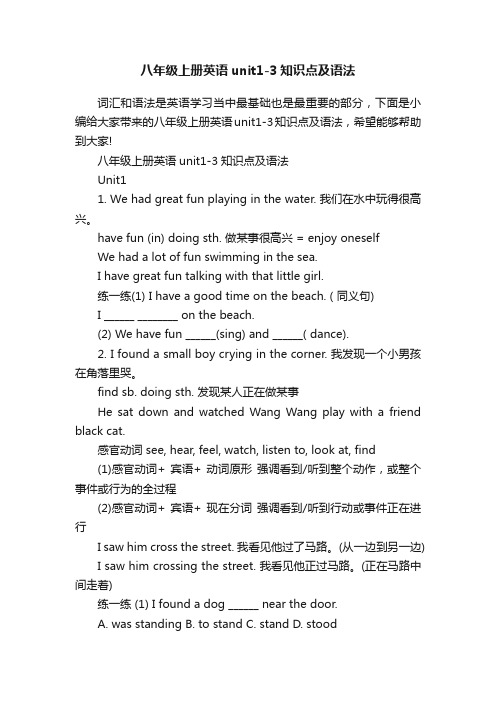
八年级上册英语unit1-3知识点及语法词汇和语法是英语学习当中最基础也是最重要的部分,下面是小编给大家带来的八年级上册英语unit1-3知识点及语法,希望能够帮助到大家!八年级上册英语unit1-3知识点及语法Unit11. We had great fun playing in the water. 我们在水中玩得很高兴。
have fun (in) doing sth. 做某事很高兴 = enjoy oneselfWe had a lot of fun swimming in the sea.I have great fun talking with that little girl.练一练(1) I have a good time on the beach. ( 同义句)I ______ ________ on the beach.(2) We have fun ______(sing) and ______( dance).2. I found a small boy crying in the corner. 我发现一个小男孩在角落里哭。
find sb. doing sth. 发现某人正在做某事He sat down and watched Wang Wang play with a friend black cat.感官动词 see, hear, feel, watch, listen to, look at, find(1)感官动词+ 宾语+ 动词原形强调看到/听到整个动作,或整个事件或行为的全过程(2)感官动词+ 宾语+ 现在分词强调看到/听到行动或事件正在进行I saw him cross the street. 我看见他过了马路。
(从一边到另一边)I saw him crossing the street. 我看见他正过马路。
(正在马路中间走着)练一练 (1) I found a dog ______ near the door.A. was standingB. to standC. standD. stood(2) She heard a little boy ______ English.A. readingB. readsC. to readD. is reading3. That made me feel very happy. 那使我感到很愉快。
Unit1Topic1--3知识点总结仁爱版英语八年级上册

单词skating滑冰rowing划船cycling骑自行车tennis网球table tennis乒乓球baseball棒球prefer更喜欢scientist科学家musician音乐家pilot飞行员policeman警察policewoman女警postman邮递员fisherman渔民quite相当;很rocket火箭during在……期间exercise运动health健康healthy健康的popular受欢迎relax放松famous有名的teammate队友leave离开(left)短语leave for 动身前往某地arrive in到达大地方arrive at到达小地方keep fit/healthy保持健康make sb strong使某人强壮cheer sb on为某人in the future在将来the day after tommorrow后天in two days两天后be good at擅长be good for your heart and lungs对心肺有益dream to do/dream of doing梦想做all over the worldSpend time doing sth花时间做某事spend time on sth在某事上花时间grow up 长大prefer A to B 比起B更喜欢A during the summer holiday在暑假have a basketball game against与……打篮球比赛play for为……效力play against与……比赛a good way to do sth做某事的好方法join in=take part in 参加短时间的活动或赛事join 加入长时间的组织/join sb加入某人the long jump跳远the high jump跳高go mountain climbing去爬山go cycling去骑行see sb doing看到某人正在做某事see sb do 看到某人做某事的全过程/看到某人经常做某事必背句子1.【询问更喜欢哪项运动】Which sport do you prefer, skating or cycling?---I prefer skating to cycling.你更喜欢哪项运动,滑冰还是骑自行车?---我更喜欢滑冰。
八年级上册英语Unit 1-3 重点短语句型

Unit 1(易错点用粗体标注)1.足够的锻炼enough exercise (enough作形容词)2.他已经足够大了,可以自己完成它。
He is old enough to do it by himself.3.因为坏天气,我们看不到下面的任何东西。
Because of the bad weather, we can’t see anything below.4.我决定不出去了。
(过)I decided not to go out.5.雨开始下大了。
(过)It started raining hard/heavily.6.一个愉快的周末an enjoyable weekend7.想知道wonder8.我不想吃任何东西。
I don’t feel like eating anything.9.我感觉我就像一只鸟。
(过)I felt like (that) I was a bird.10.我正在等你。
I’m waiting for you.11.一把伞an umbrella12.食物吃起来不错。
(过)The food tasted good.13.你觉得它怎么样?What do you think of it? = How do you like it?14.你和谁一起去了吗?Did you go with anyone?15.相当多quite a few (区分quiet adj. 安静的)大部分时间most of the timeUnit 2(易错点用粗体标注)1.帮忙做家务help with housework2.锻炼exercise(v.) do exercise(不可数n.)3.做眼保健操do eyes exercise s(可数n.)4.做英语练习题do English exercise s(可数n.)5.购物go shopping6.一直all the time大多时候most of the time7.一周一次once a week8.一周两次twice a week9.一周三次three times a week10.你周末通常做什么?我通常去看电影。
仁爱英语八年级上册Unit1—Unit3知识点归纳
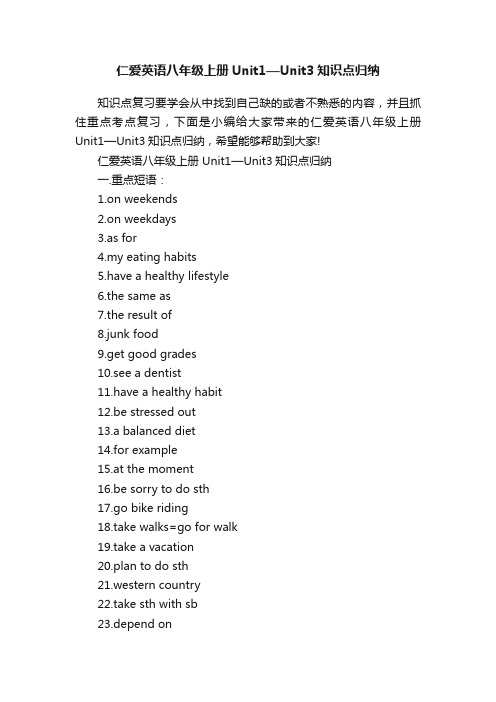
仁爱英语八年级上册Unit1—Unit3知识点归纳知识点复习要学会从中找到自己缺的或者不熟悉的内容,并且抓住重点考点复习,下面是小编给大家带来的仁爱英语八年级上册Unit1—Unit3知识点归纳,希望能够帮助到大家!仁爱英语八年级上册 Unit1—Unit3知识点归纳一.重点短语:1.on weekends2.on weekdays3.as for4.my eating habits5.have a healthy lifestyle6.the same as7.the result of8.junk food9.get good grades10.see a dentist11.have a healthy habit12.be stressed out13.a balanced diet14.for example15.at the moment16.be sorry to do sth17.go bike riding18.take walks=go for walk19.take a vacation20.plan to do sth21.western country22.take sth with sb23.depend on24.host family25.hardly ever26.ask sb about sth27.get back to school28 .a balance of29.kind of二.考点归纳:考点1.want sb to do sth 想要某人干某事His father wants him_____(become )an actor.考点2.try 的用法:1).try to do sth 尽力干某事He tries ______(eat) lots of vegetables and fruit every day .2).try not to do sth 尽力不干某事We try______(not let) my teacher down.3).try one’s best to do sth 尽某人最大努力干某事We should try our best ______ (study) all subjects.4)词组: try on 试穿 have a try 试一试考点3.although 的用法:although /though 引导让步状语从句,“即使,虽然”,不能与but 连用,但可与yet, still 连用。
八年级上册英语1-3单元重点知识点归纳(2019版)

八年级上册英语1-3单元重点知识点归纳(2019版)Unit 1: Hello!Greetings•Greetings: hello, hi, good morning/afternoon/evening, good night•Farewells: goodbye, bye, see you, take careIntroductions•Self-introduction: My name is…, I am…, Nice to meet you.•Asking and answering questions about personal information: name, age, nationality, etc.Classroom Language•Classroom instructions: Sit down, Stand up, Open your books, Close your books, etc.•Responses to classroom instructions: Yes, I will. No, I won’t.Numbers•Cardinal numbers: one, two, three, four, etc.•Ordinal numbers: first, second, third, fourth, etc.Unit 2: My School LifeSubjects•Subjects: English, math, science, history, geography, etc.•Talking about favorite subjects: My favorite subject is…School Facilities•Facilities in school: classrooms, library, computer room, playground, etc.•Talking about facilities in school: Our school has…Daily Activities•Talking about daily activities: get up, have breakfast/lunch/dinner, go to school, study, play sports, etc.Time Expressions•Time expressions: in the morning/afternoon/evening, at 7 o’clock, on weekdays/weekends, etc.Unit 3: My FriendsDescribing People•Physical appearance: tall, short, slim, overweight, etc.•Personality traits: friendly, kind, funny, etc.•Talking about someone’s appearance and personality: He/She is…Hobbies and Interests•Hobbies: playing sports, listening to music, drawing, etc.•Talking about hobbies and interests: I like…, My hobby is…Likes and Dislikes•Expressing likes and dislikes: I like…, I don’t like…•Talking about preferences: I prefer…, I would rather…Making Plans•Making plans: Let’s…, What about…, How about…•Accepting and declining invitations: Sure, I’d love to. Sorry, I can’t.以上是八年级上册英语1-3单元的重点知识点归纳。
八年级英语上册1-3单元知识点

Unit 1 Where did you go on vacation?Phrazes and expressions(短语与表达):go on vacation去度假quite a few相当多go out出去of course当然;自然feel like给……的感觉;感受到because of因为ride bycycles/bikes骑自行车take photos 照相wait for 等待have a good time=enjoy oneself=have fun(doing sth.)玩得痛快Key sentences:(Grammar focus中句子)Did you buy anything special?你买特别的东西了吗?Everything tasted really good!所有的东西尝起来真的很好吃!And because of the bad weather,we couldn’t see anything below.而且因为坏天气,我们没能看到下面的任何东西重点语法:1、复合不定代词2、一般过去式一般过去时精讲1.一般过去时表示过去某个时间发生的动作或存在的状态,常和表示过去的时间状语连用。
一般过去时也表示过去经常或反复发生的动作。
2.Be动词在一般过去时中的变化:⑴am 和is在一般过去时中变为was。
(was not=wasn't)⑵are在一般过去时中变为were。
(were not=weren't)⑶带有was或were的句子,其否定、疑问的变化和is, am, are一样,即否定句在was或were后加not,一般疑问句把was或were调到句首。
3.句中没有be动词的一般过去时的句子否定句:didn't +动词原形,如:Jim went home yesterday. Jim didn't go home yesterday.一般疑问句:在句首加did,句子中的动词过去式变回原形。
新版八年级上册英语一至三单元知识点

新版八年级上册英语一至三单元知识点一. 单元一:What’s your name?1. 问候与自我介绍•问候语:Hello! How are you?•自我介绍:My name is [你的名字]. I’m [你的年龄]. I’m from [你的国家/城市].2. 询问姓名与国籍•What’s your name?(你叫什么名字?)•Where are you from?(你从哪里来?)3. 熟悉数字•数字1-100的读法:one, two, three, four, five, six, seven, eight, nine, ten, eleven, twelve, thirteen, fourteen, fifteen, sixteen, seventeen, eighteen, nineteen, twenty, thirty, forty, fifty, sixty, seventy, eighty, ninety, one hundred.4. 人称代词•第一人称代词:I, we•第二人称代词:you•第三人称代词:he, she, it, they5. 介绍家庭成员•Who is he/she?(他/她是谁?)•Is he/she your brother/sister?(他/她是你的哥哥/姐姐吗?)•How old is he/she?(他/她多大了?)二. 单元二:How are you?1. 询问他人身体状况•How are you?(你好吗? / 你身体好吗?)•I’m fine/good, thanks.(我很好,谢谢。
)2. 表达感受•I’m happy/sad.(我开心/伤心。
)•I’m tired.(我累了。
)•I’m hungry/thirsty.(我饿了/渴了。
)•I’m cold/hot.(我冷/热。
)3. 询问原因•Why are you happy/sad?(你为什么开心/伤心?)4. 回答方式•I’m happy/sad because…(我开心/伤心是因为…)5. 询问并回答他人的感受•How is he/she?(他/她好吗?)•He/She is happy/sad/tired/hungry/thirsty/cold/hot.(他/她很开心/伤心/累了/饿了/渴了/冷/热。
初中英语人教版八年级上册重点知识整理(1~3单元)

八年级英语上册重点知识整理Unit1 Where did you go on vacation?【重点语法】不定代词:不指名代替任何特定名词或形容词的代词叫做不定代词。
用法注意:1、some 和any+可数名/不可数名。
some 多用于肯定句,any多用于否定句、疑问句和条件从句。
有些问句中用some,不用any, 问话者希望得到对方肯定回答。
2、由some, any, no,every 与 body, one, thing构成的复合不定代词作主语时,其谓语动词用三单。
3、不定代词若有定语修饰,该定语要置于其后:如:something interesting【重点短语】1.buy sth for ab./ buy sb.sth 为某人买某物2.taste + adj.尝起来……3.nothing...but + V.(原形) 除了……之外什么都没有4.seem + (to be) + adj 看起来5.arrive in + 大地方 / arrive at + 小地方到达某地6.decide to do sth.决定做某事7.try doing sth.尝试做某事 / try to do sth.尽力做某事8.enjoy doing sth.喜欢做某事9.want to do sth.想去做某事10.start doing sth.开始做某事/ begin doing sth.11.stop doing sth.停止做某事区分:stop to do sth.停下来去做某事12.dislike doing sth.不喜欢做某事14.so + adj + that + 从句如此……以至于……16.tell sb.(not) to do sth.告诉某人(不要)做某事17.keep doing sth. 继续做某事18.forget to do sth.忘记去做某事 / forget doing sth 忘记做过某事【词语辨析】1.take a photo/ take photos 拍照2.seem + 形容词看起来…seem + to do sth.似乎/好像做某事It seems + 从句似乎..….It seems that no>seem like ...好像,似乎…3.arrive in +大地点= get to= reach+地点名“到达......”arrive at +小地点(注:若后跟地点副词here/there/home, 介词需省略,如:arrive here; get home)4.feel like sth 感觉像…feel doing sth.想要做某事5.wonder(想知道)+疑问词(who, what, why)引导的从句。
【K12学习】八年级上册英语1-3单元重点知识点归纳(XX版)

八年级上册英语1-3单元重点知识点归纳(XX版)Unit1heredidyougoonvacation?词汇:1.anyonepron.任何人anyone和anybody相同,与单数谓语动词连用,常用于疑问句和否定句中。
anyone指某些人或事物中的任何一个,常与of连用。
作主语时,谓语动词用单数。
soeone某个人,常用于肯定句中,作主语时,谓语动词用单数。
另外anyone,soeone,anything,soething 等不定代词,soehere,anyhere等不定副词被形容词修饰时,形容词要后置。
e.g.soethingiportant2.quiteafe不少,相当多含义修饰可数名词修饰不可数名词含义许多quiteafequitealittle许多仅有几个onlyafeonlyalittle 只有一点非常少veryfeverylittle非常少3.tastev.尝起来感官动词loo,sound,feel,sell,taste都可作连系动词,后接形容词作表语,说明主语所处的状态。
n.欣赏力,味道thetasteof…/goodtaste4.excellentad卓越的,杰出的beexcellentin在…方面极好5.Hodidyoulieit?你认为它怎么样?=hatdidyouthinofit?6.feedv.喂养,喂过去式:fedfeed常与介词on连用,表示“给…喂…”feed…to…“把…喂给…7.seev.似乎,好像see作连系动词时,其后直接加形容词。
see与介词lie连用,表示似乎,看来,好像。
see后加不定式常与Itseesthat从句替换e.g.Heseestonothisgirl.=Itseesthathenosthisgirl.8.d ecidev.决定过去式:decideddecidetodosth.决定做某事decidenottodosth.决定不去做某事n.decision决定aeadecisiontodosth.9.tryv.设法,尝试trydoingsth.尝试做trytodosth.努力做某事tryone’sbesttodosth.尽某人最大努力去做n.haveatry试一试,尝试10.feellie感觉像,想要feellie后加名词或动名词11.ondern.惊奇,奇迹,奇观theSevenondersoftheorld世界七大奇观v.想知道tooany太多太多如此多any修饰可数名词tooanysoanyuch修饰不可数名词toouchsouch13.enoughad 充足的,足够的enoughoneyadv.充足地goodenough14.eepv.保持,继续eepdoingsth.表示一直做某事eep+sth.+ad表示使某物处于某种状态eep用于借书或其他物品一段时间15.exciteentn.兴奋,刺激,令人兴奋的事常与介词in搭配使用,充当副词的作用inexciteent兴奋地语法:一般过去时构成形式:主系表主语+as/ere+…主谓宾主语+谓语动词+宾语一般过去时的时间状语:介词+表示过去时间的年、月、日,如in1983.yesterday以及由yesterday构成的短语。
人教版英语八上1-3单元基础知识总结

八年级上册1-3单元知识点归类总结Unit 1 Where did you go on vacation?(谈论假期生活,一般过去时)Unit 2 How often do you exercise?(谈论生活习惯,一般现在时)Unit 3 I'm more outgoing than my sister(谈论事物对比,形容词比较级)Unit 1 Where did you go on vacation? 第一单元主要点:①复习一般过去时②复合不定代词的用法③反身代词的用法④系动词的用法⑤动词后的to do和doing 的区别⑥ed形容词和ing形容词的区别⑦“近义词”的区别⑧本单元中的主谓一致现象⑨动词过去式的构成及不规则动词表⑩用同义短语转换同义句时谓语动词形式一致性的培养。
⑾感叹句的结构和连词的选择。
一、词组、短语:1、go on vacation去度假,2、stay at home 呆在家,3、go to the mountains 上山/进山,4、go to the beach到海边去,5、visit museums 参观博物馆,6、go to summer camp 去夏令营,7、quite a few 相当多,8、study for为……学习,9、go out 出去,10、most of the time 大部分时间/绝大多数时间,11、taste good 尝起来味道好,12、have a good time玩的开心,13、of course当然可以,14、feel like感觉像……/想要,15、go shopping购物,16、in the past 在过去,17、walk around绕……走,18、too many 太多(可数名词前面),19、because of 因为,20、one bowl of 一碗……,21、find out 查出来/发现,22、go on继续,23、take photos 照相,24、something important重要的事情,25、up and down上上下下,26、come up出来二、重要句子(语法):Where did you go on vacation?你到哪里去度假了?I went to New York City.我去了纽约城Did you go out with anyone? 你出去带人吗?No, No one was here. Everyone was on vacation.不,没有人在这儿。
(完整版)八年级英语上册1-4单元知识点总结
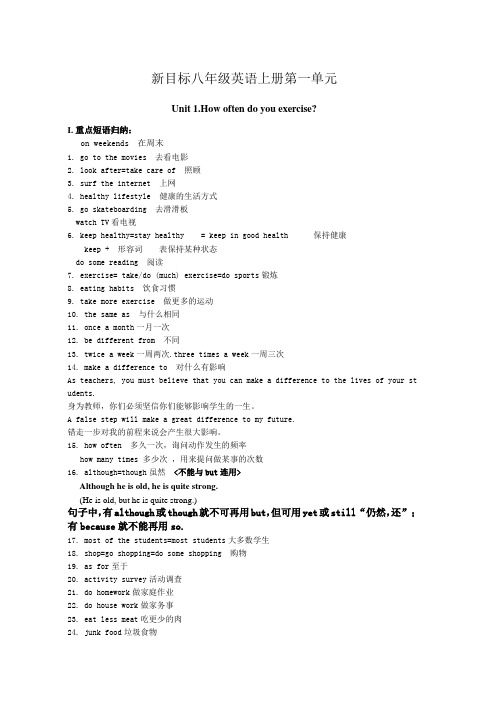
新目标八年级英语上册第一单元Unit 1.How often do you exercise?I. 重点短语归纳:on weekends 在周末1. go to the movies 去看电影2. look after=take care of 照顾3. surf the internet 上网4. healthy lifestyle 健康的生活方式5. go skateboarding 去滑滑板watch TV看电视6. keep healthy=stay healthy = keep in good health 保持健康keep + 形容词表保持某种状态do some reading 阅读7. exercise= take/do (much) exercise=do sports锻炼8. eating habits 饮食习惯9. take more exercise 做更多的运动10. the same as 与什么相同11. once a month一月一次12. be different from 不同13. twice a week一周两次.three times a week一周三次14. make a difference to 对什么有影响As teachers, you must believe that you can make a difference to the lives of your st udents.身为教师,你们必须坚信你们能够影响学生的一生。
A false step will make a great difference to my future.错走一步对我的前程来说会产生很大影响。
15. how often 多久一次,询问动作发生的频率how many times 多少次,用来提问做某事的次数16. although=though虽然<不能与but连用>Although he is old, he is quite strong.(He is old, but he is quite strong.)句子中,有although或though就不可再用but,但可用yet或still“仍然,还”;有because就不能再用so.17. most of the students=most students大多数学生18. shop=go shopping=do some shopping 购物19. as for至于20. activity survey活动调查21. do homework做家庭作业22. do house work做家务事23. eat less meat吃更少的肉24. junk food垃圾食物25. be good for 对什么有益26. be bad for对什么有害27. want to do sth 想做某事28. want sb to do sth想某人做某事29. try to do sth 尽量做某事30. come home from school放学回家31. of course=certainly=sure当然32. get good grades取得好成绩33. some advice 一些建议some advice 中的advice 是不可数名词 a piece of advice 一则建议 give advice 提出建议take one’s advice 采纳或听从某人的建议4. help sb to do sth帮助某人做某事=help sb with sth35. a lot of vegetables=many vegetables许多蔬菜36. hardly= almost not几乎不hardly ever很少,几乎不,从不37. keep/be in good health保持健康38.your favorite program你最喜欢的节目39. Animal World 动物世界40. play soccer踢足球41.every day 每天every day 与everyday1. every day 作状语,译为“每一天”。
仁爱版八年级英语上册Unit 1 Topic 3知识点总结
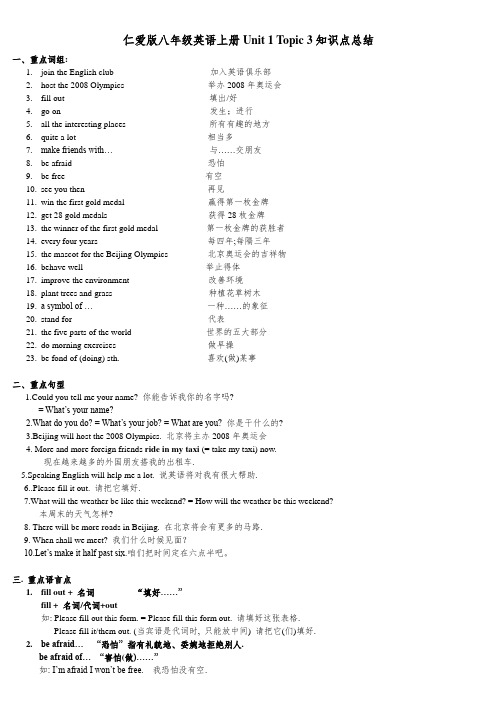
仁爱版八年级英语上册Unit 1 Topic 3知识点总结一、重点词组:1.join the English club 加入英语俱乐部2.host the 2008 Olympics 举办2008年奥运会3.fill out 填出/好4.go on 发生;进行5.all the interesting places 所有有趣的地方6.quite a lot 相当多7.make friends with… 与……交朋友8.be afraid 恐怕9.be free 有空10.see you then 再见11.win the first gold medal 赢得第一枚金牌12.get 28 gold medals 获得28枚金牌13.the winner of the first gold medal 第一枚金牌的获胜者14.every four years 每四年;每隔三年15.the mascot for the Beijing Olympics 北京奥运会的吉祥物16.behave well 举止得体17.improve the environment 改善环境18.plant trees and grass 种植花草树木19.a symbol of … 一种……的象征20.stand for 代表21.the five parts of the world 世界的五大部分22.do morning exercises 做早操23.be fond of (doing) sth. 喜欢(做)某事二、重点句型1.Could you tell me your name? 你能告诉我你的名字吗?= What’s your name?2.What do you do? = What’s your job? = What are you? 你是干什么的?3.Beijing will host the 2008 Olympics. 北京将主办2008年奥运会4. More and more foreign friends ride in my taxi (= take my taxi) now.现在越来越多的外国朋友搭我的出租车.5.Speaking English will help me a lot. 说英语将对我有很大帮助.6..Please fill it out. 请把它填好.7.What will the weather be like this weekend? = How will the weather be this weekend?本周末的天气怎样?8. There will be more roads in Beijing. 在北京将会有更多的马路.9. When shall we meet? 我们什么时候见面?10.Let’s make it half past six.咱们把时间定在六点半吧。
八上英语一二单元知识点汇总
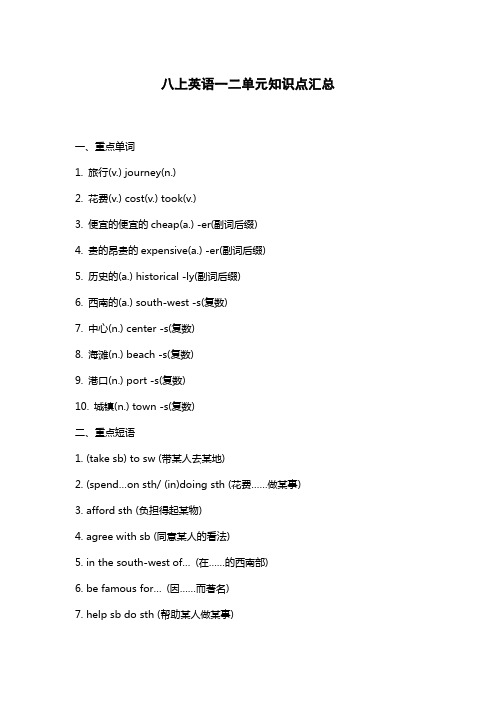
八上英语一二单元知识点汇总一、重点单词1. 旅行(v.) journey(n.)2. 花费(v.) cost(v.) took(v.)3. 便宜的便宜的cheap(a.) -er(副词后缀)4. 贵的昂贵的expensive(a.) -er(副词后缀)5. 历史的(a.) historical -ly(副词后缀)6. 西南的(a.) south-west -s(复数)7. 中心(n.) center -s(复数)8. 海滩(n.) beach -s(复数)9. 港口(n.) port -s(复数)10. 城镇(n.) town -s(复数)二、重点短语1. (take sb) to sw (带某人去某地)2. (spend…on sth/ (in)doing sth (花费……做某事)3. afford sth (负担得起某物)4. agree with sb (同意某人的看法)5. in the south-west of…(在……的西南部)6. be famous for…(因……而著名)7. help sb do sth (帮助某人做某事)8. feel+形容词(宾语从句) (感觉到某事物)9. a place where+从句(一个……的地方)10. as+adj.+as possible (尽可能……地)三、重点句型1. It is +adj+for sb+to do sth 对某人来说做某事……的。
2. What+adj+名词+主语+be? ……怎么样?3. How+adj/adv+主语+be? ……怎么样?4. There are many different kinds of/places…(有很多不同种类的/地方……)5. I’m sure/I believe that…(我相信……)6. Would you like to do sth? (你愿意做某事吗?)。
- 1、下载文档前请自行甄别文档内容的完整性,平台不提供额外的编辑、内容补充、找答案等附加服务。
- 2、"仅部分预览"的文档,不可在线预览部分如存在完整性等问题,可反馈申请退款(可完整预览的文档不适用该条件!)。
- 3、如文档侵犯您的权益,请联系客服反馈,我们会尽快为您处理(人工客服工作时间:9:00-18:30)。
八年级上册英语1-3单元重点知识点归纳(XX版)Unit1heredidyougoonvacation?词汇:1.anyonepron.任何人anyone和anybody相同,与单数谓语动词连用,常用于疑问句和否定句中。
anyone指某些人或事物中的任何一个,常与of连用。
作主语时,谓语动词用单数。
soeone某个人,常用于肯定句中,作主语时,谓语动词用单数。
另外anyone,soeone,anything,soething等不定代词,soehere,anyhere等不定副词被形容词修饰时,形容词要后置。
e.g.soethingiportant2.quiteafe不少,相当多含义修饰可数名词修饰不可数名词含义许多quiteafequitealittle许多仅有几个onlyafeonlyalittle只有一点非常少veryfeverylittle非常少3.tastev.尝起来感官动词loo,sound,feel,sell,taste都可作连系动词,后接形容词作表语,说明主语所处的状态。
n.欣赏力,味道thetasteof…/goodtaste4.excellentad卓越的,杰出的beexcellentin在…方面极好 5.Hodidyoulieit?你认为它怎么样?=hatdidyouthinofit?6.feedv.喂养,喂过去式:fedfeed常与介词on连用,表示“给…喂…”feed…to…“把…喂给…7.seev.似乎,好像see作连系动词时,其后直接加形容词。
see与介词lie连用,表示似乎,看来,好像。
see后加不定式常与Itseesthat从句替换e.g.Heseestonothisgirl.=Itseesthathenosthisgirl.8.decidev.决定过去式:decideddecidetodosth.决定做某事decidenottodosth.决定不去做某事n.decision决定aeadecisiontodosth.9.tryv.设法,尝试trydoingsth.尝试做trytodosth.努力做某事tryone’sbesttodosth.尽某人最大努力去做n.haveatry试一试,尝试10.feellie感觉像,想要feellie后加名词或动名词11.ondern.惊奇,奇迹,奇观theSevenondersoftheorld世界七大奇观v.想知道tooany太多太多如此多any修饰可数名词tooanysoanyuch修饰不可数名词toouchsouch13.enoughad 充足的,足够的enoughoneyadv.充足地goodenough14.eepv.保持,继续eepdoingsth.表示一直做某事eep+sth.+ad表示使某物处于某种状态eep用于借书或其他物品一段时间15.exciteentn.兴奋,刺激,令人兴奋的事常与介词in搭配使用,充当副词的作用inexciteent兴奋地语法:一般过去时构成形式:主系表主语+as/ere+…主谓宾主语+谓语动词+宾语一般过去时的时间状语:介词+表示过去时间的年、月、日,如in1983.yesterday以及由yesterday构成的短语。
带有ago的短语如st构成的短语如lastee/year/onth等表示过去时间的词或短语,如once,atthattie,justno等。
Unit2Hooftendoyouexercise?helpv.&n.帮助helpsb.dosth.帮助某人做某事helpsb.ithsth.帮助某人某事 2.hardlyadv.几乎不,几乎没有表示否定含义,常用于实意动词之前,系动词、助动词、情态动词之后。
用于反义疑问句时,附加疑问句部分用肯定形式。
hardad艰难的,坚硬的adv.努力地,长时间地,大量地3.everadv.在任何时候,从来,曾经主要用于否定句,疑问句和条件句中。
ever曾经,多与完成时连用;once曾经,多与过去时连用。
4.everyday与everyday用法例句everyday副词短语,作状语,译为“每天”,相当于eachdayHereadsnespaperseveryday.everyday形容词,只作定语,译为“日常的”,相当于dailyTheInternethasbeepartofoureverydaylife.5.fullad忙的,满的,充满的befullof充满……同义词反义词full忙的busyfreefull满的\epty6.singn.摆动,秋千v.摆动;摇摆过去式sung7.aybeadv.大概;或许;可能aybe副词,意思是“也许,可能”,在句中作状语,常位于句首aybeshe’llethisafternoon.aybeay是情态动词,be是动词原形,构成完整的谓语形式,与主语形成系表结构,译为“也许是,可能是”。
Heaybeasoldier.7.stayup熬夜stayuplate8.junn.无用的东西,无价值的东西junfood垃圾食品9.coffeen.咖啡为不可数名词,可用acupofcoffee。
10.begoodfor对……有益begoodfor对…有益Eatingvegetablesisgoodforhealth.begoodto对…好HeasgoodtoehenIasill.begoodith善于应付…的Heisverygoodithchildren.begoodat擅长I’goodatplayingchess.11.healthn.健康healthyad健康的unhealthy不健康的be/eep/stayingoodhealth=be/eep/stayhealthy保持健康asv.询问;请求assb.todosth.否定形式为assb.nottodosth.assb.aboutsth.就某事询问某人assb.forsth.向某人要某物13.percentn.百分之……为可数名词,单复数形式相同percentof后接名词作主语时,如果该名词是不可数名词或单数可数名词,谓语动词用单数形式;若为可数名词复数形式,则谓语动词用复数形式。
14.onlinead在线的,联网的。
goonline上网e.g.onlineshoppingisbothcheapandconvient.15.surprisedad感到吃惊的主语是人e.g.IassurprisedhenIheardthenes.surpringad令人吃惊的主语是事物e.g.yoursuccessissurpring.16.althoughcon虽然,尽管,即使although不能与but连用。
17.Itis+adtodosth.做某事是……的。
it作形式主语,真正的主语是后面的不定式。
18.throughprep.以,凭借,穿过表示从……中通过,着重指从内部空间的一头纵穿到另一头。
across穿过,表示从一条线或一物体表面的一边到另一边。
e.g.ealedacrossthebridge.19.indn.头脑,心智theindandthebody身心have……inind记得……eep……inind记住……“ouldyouindsth./doingsth.你介意某事吗?20.spendv.花费sb.spend+时间+onsth./doingsth.21.diev.消失,灭亡,死亡过去式:died 现在分词:dyingdieof“死于”,多用于内因diefro多用于外因22.dentistn.牙科医生gotothedentist=gotothedentist’s频度副词频率由大及小排列:alays,usually,often,soeties,hardlyever,never频度副词放在系动词、助动词或情态动词之后,行为动词之前。
对频度副词提问时,一般用hooftenhooften用来询问在某一段时间内进行某个动作的次数;hoanyties多少次,它不问动作发生的频率,只询问次数,即答语为once,tice,threeties.次数+every+基数词+时间表示“每……次”Unit3I’oreoutgoingthanysisteras…as…和……一样as和as中间接形容词或副词的原级否定:notas…as…或notso…as…和…不一样e.g.ToisnotasshortasTi.=ToisshorterthanTo.2.inv.赢,赢得现在分词:inning过去式:onn.innerin过去式on“赢,获胜”,通常跟gae,ar,atch,prize等之类的名词作宾语,即insth.beat过去式beat“击败,胜过”,后跟表示与之比赛、战斗的人或代表群体的名词,即beatsb.3.talentedad有才能的,有才干的近义词:giftedbetalentedin在…方面有天赋,后接名词或doing。
n.talent天赋haveatalentfor 有…才能,天赋 4.trulyadv.真正,确实;由衷地,真诚地truead真实的truthn.真相5.careabout关心,在意carefor 喜欢,愿意,照顾taecare小心,当心taecareof照顾,照料6.aev.做,制作,迫使ae作使役动词时,译为“使……”,后接省略to的不定式作宾语补足语,即aesb.dosth.ae+宾语+形容词 ughv.笑,发笑laughat嘲笑8.thesaeas…和…一样/differentfro…与…不同9.bothad置于被修饰的名词前adv.主语后,实意动词前be动词之后pron.bothof…Both…and……和…两者都e.g.BothNeyorandLondonhavetrafficprobles.Bothsheand IaregoodatEnglish.10.seriousad严肃的,稳重的;认真的adv.seriously认真地,严肃地11.aslongas用于as…as句型中,表示“像…一样长”表示时间,“达…之久”。
e.g.yoncaneepthebooaslongasyoulie.表示条件,“只要”,引导条件状语从句。
12.bringout使表现出,取出,说出e.g.Pleasebringoutyourboo.youarenevergoingtobringoutthat.Acrisisbringsoutthebestinher.13.thoughadv.不过,可是,然而con虽然,尽管,不过作连词时,与although 含义大致相同,和but不能出现在一个句子当中。
Although 只放在句首,though既可放在句首,也可放在句中。
